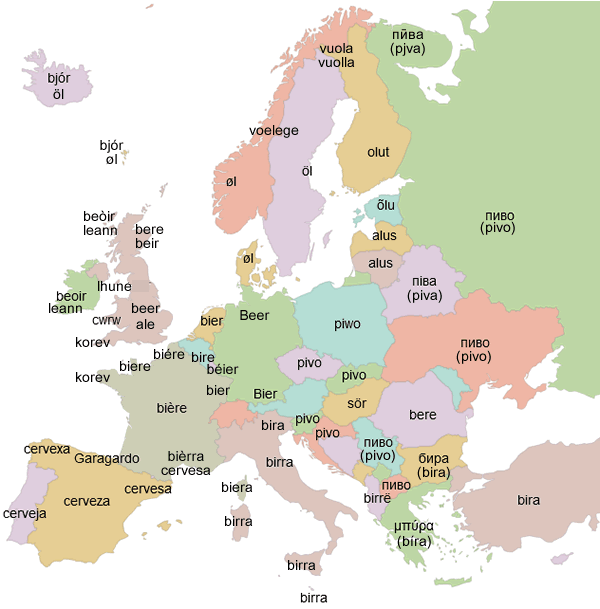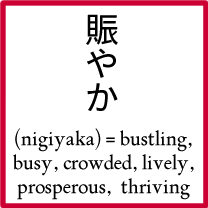
Here’s a recording in a mystery language.
Do you know or can you guess the language, and do you know where it’s spoken?

Here’s a recording in a mystery language.
Do you know or can you guess the language, and do you know where it’s spoken?
The Irish word ceolchoirm [ˈcʲolˠ.xorʲəmʲ] means concert. It is made up of ceol (music) and coirm [korʲəmʲ] (feast, banquet, ale, beer). There are similar words in Scottish Gaelic (cuirm-chiùil), and Manx (cuirrey kiaull) [source].
The word coirm comes from the Old Irish word coirm (ale, beer), from the Proto-Celtic *kurmi (beer). Words for beer in the Brythonic Celtic languages come from the same root: cwrw in Welsh, and korev in Cornish and Breton [source].
The Latin word cervēs(i)a [kerˈu̯eː.si.a], which means beer made of wheat, especially of higher quality, comes from the same Proto-Celtic root, as do words for beer in some Romance languages, including cervexa in Galician, cervesa in Catalan and Occitan, cerveza in Spanish and cerveja in Portuguese [source].
From the same Proto-Celtic root we get the French word cervoise [sɛʁ.vwaz], which was a kind of ale or beer made from barley or wheat and without hops during the Middle Ages [source]. The archaic Italian word cervogia [t͡ʃerˈvɔ.d͡ʒa] (beer, ale made from barley or oats) was borrowed from the Old French cervoise [source].
The usual French word for beer is bière [bjɛʁ], which was borrowed from the Middle Dutch bier/bēr (beer), from the Old Dutch *bier, from Frankish *bior (beer), from the Proto-Germanic *beuzą (beer) [source].
Words for beer is some Germanic languages come from the same root, including Bier in German, bier in Dutch, and beer in English [source].
The Italian word for beer, birra, was borrowed from the German Bier, and the Greek word μπίρα (bíra – beer, ale) was borrowed from Italian, as were words for beer in Arabic, بِيرَا (bīrā), Maltese, birra, and Turkish, bira [source].
The Irish word beoir (beer) comes from the Middle Irish beóir (beer), from Old Norse bjórr (beer), which also has descendents in Scottish Gaelic (beòir), Manx (beer), Icelandic (bjór) and Faroese (bjór) [source].
Another word for beer or ale in North Germanic languages is øl (in Danish, Faroese, Norwegian) / öl (in Swedish and Icelandic). This comes from the Old Norse word ǫl (ale, beer), possibly from the Proto-Norse ᚨᛚᚢ (alu – ale), from the Proto-Germanic *alu (beer, ale), from Proto-Indo-European *h₂elut- (beer) [source].
Words for beer in Finnic languages possibly come from the same Proto-Germanic root, including õlu in Estonian, olut in Finnish, Igrian, Karelian and Veps, and oluq in Võro [source].
In Slavic languages words for beer come from the Proto-Slavic *pȋvo (drink, beer, beverage), including пиво (pivo) in Russian, Rusyn, Ukrainian, Bulgarian, Macedonian and Serbian, pivo in Slovenian, Czech and Slovak, and piwo in Polish and Sorbian [source].
Here’s a map of words for beer in European languages:

Source: https://ukdataexplorer.com/european-translator/?word=beer
A Japanese lesson that I studied on Duolingo today included names of parts of Tokyo. One of these was 渋谷 (Shibuya), which, according to Wikipedia, is a major commercial and finance centre, and houses two of the busiest railway stations in the world, Shibuya (渋谷駅) and Shinjuku (新宿駅).
The first character in Shibuya (渋) is rare, and I haven’t seen it anywhere else. On it’s own it means the “astringent taste of unripe persimmon fruit” and is a simplified form of 澁 (jū/shibu), which is mainly used in personal names [source].
The second character in Shibuya (谷) means valley, lowland or plain. It’s pronounced tani, kiwa, koku or ya.
渋 is pronounced shū, sō, jū or shibu. It appears in words such as:
The character 澁 (sè) exists in Chinese, and is an old variant of 澀 [涩] (sè), which means astringent, tart, puckery,acerbity, unsmooth, rough, hard to understand, obscure. This is quite appropriate as it’s quite an obscure character.
Now trying saying 这柿子涩 (zhè shìzi sè) many times as quickly as you can. It means the persimmon tasts puckery, a word I hadn’t come across before that means high in tannins (of wine), causing pucking or tending to pucker.
Sources: jisho, MDBG, LINE Dict Chinese-English, The Free Dictionary

Here’s a recording in a mystery language.
Do you know or can you guess the language, and do you know where it’s spoken?
In the French conversation group last night, one of the members mentioned that she has been on the wagon for two weeks, or in other words, she has stopped drinking alcohol. French equivalents of being on the wagon include:
If you fall of the wagon (go back to drinking), then you could say:
In English, the expression to be on the wagon usually means
“abstaining from drinking any alcoholic drink, usually in the sense of having given it up (as opposed to never having partaken); teetotal”
It can also means “Maintaining a program of self-improvement or abstinence from some other undesirable habit.” (such as smoking).
It was apparently coined in the USA and was originally ‘on the water-cart’, and became ‘on the water-wagon’ the ‘on the wagon’. It referred to carts (like the one pictured above) that were used to hose down dusty roads. The idea was that someone who was ‘on the wagon’ was drinking water rather than alcoholic drinks.
It was possibly first used by the temperance movement, which emerged in the 19th century in organisations such as the Washingtonian movement (founded in 1840), The Woman’s Christian Temperance Union (founded in 1874) and The Anti-Saloon League (founded in 1893).
Sources: ReversoDictionary, Wiktionary, The Phrase Finder, Wikipedia
I have been on the wagon (teetotal) since 2002, and didn’t drink much alcohol before then anyway.
How do you talk about being ‘on the wagon’ or ‘falling off the wagon’ in other languages?

Here’s a recording in a mystery language.
Do you know or can you guess the language, and do you know where it’s spoken?

The Japanese word 賑やか / にぎやか (nigiyaka) means bustling, busy, crowded, lively, prosperous or thriving, and also loud, noisy, merry or cheerful. I find it very satisfying to say, which is why I chose to write about it today.
Here are some examples of how it’s used and related words (from Jisho.org and Reverso):
In Mandarin the character 赈 [賑] (zhèn) means to relieve or relief. It appears in such words as:
One Chinese equivalent of 賑やか is 热闹 [熱鬧] (rènao), which means bustling with noise and excitement, lively, to liven up, a spectacle, or literally “hot noisy”. Most Chinese people I know prefer places that are 热闹 to ones that are too 安静 (ānjìng – quiet, peaceful), and as most places in China and Taiwan are 热闹, this is probably a good thing.
Sources: LINE Dictionary Chinese – English, MDBG Word Dictionary
I generally prefer quiet, peaceful places, but occasionally don’t mind a bit of lively bustle. How about you?

Here’s a recording in a mystery language.
Do you know or can you guess the language, and do you know where it’s spoken?
An interesting Dutch word I learnt recently is kwetsen [ˈkʋɛtsə(n)], which means to hurt (sb’s feelings) or to harm, and in some Dutch dialects it means to wound or injure.
Related words include:
It comes from the Middle Dutch word quetsen, from the Old Dutch quezzon (to damage, hurt), and was possibly influenced by or borrowed from the Old French quasser (to break, annul, quash), from the Latin quassāre (to shake, agitate), from the Proto-Indo-European *kʷeh₁t- (to shake) [source].
The German word quetschen [ˈkvɛtʃən] (to squash, crush, squeeze, mash, strain) probably comes from the same root [source], as does the Yiddish word קוועטשן (kvetshn – to squeeze, pinch; bother, complain), from which we get the English word kvetch [kvɛtʃ] (to whine or complain, often needlessly and incessantly) [source].
Incidentally, the German equivalent of a squeezebox (an informal name for accordions, concertinas and related instruments) is a Quetschkommode, or literally a “squeeze commode / dresser / chest of drawers” [source].
The English word quash (to defeat decisively; to void or suppress) comes from the same Old French word (quasser), via the Middle English quaschen, quasshen, cwessen, quassen (to crush, smash, cancel, make void, shake) [source].
From the same PIE root (*kʷeh₁t-) we get the English words pasta, paste, pastiche and pastry [source]. Pasta, for example, comes from the Italian pasta (paste, pasta), from the Late Latin pasta (dough, pastry cake, paste), from the Ancient Greek πάστα (pásta – barley porridge), from παστός (pastós – sprinkled with salt), from πάσσω (pássō – to sprinkle) [source].
If your hands and fingers become quobbled, should you be worried?
Quobbled is an dialect word from Wiltshire in the south west of England that means wrinkly – so there would be no need to worry, it’s just a temporary phenomenon.
According to Words and Phrases from the Past, quobbled is defined as:
quobbled, adj. of a woman’s hands: shrivelled and wrinked from being too long in the washtub (English dialect)
Another definition is found in A Glossary of Words Used in the County of Wiltshire
By George Edward Dartnell, and Edward Hungerford Goddard (1893):
quobble. n. and v. After being a long while in the washtub a woman’s hands are apt to get ‘all in a quobble,’ or ‘ter’ble quobbled,’ that is, shrivelled and drawn and wrinkled up.
In Joseph Wright’s 1903 book, The English dialect dictionary, being the complete vocabulary of all dialect words still in use, or known to have been in use during the last two hundred years; founded on the publications of the English Dialect Society and on a large amount of material never before printed. (they really went in for short, snappy title back then), we find:
quobble, v. Of water: to make a noise in boiling
Then there’s:
quob, sb. and v.
1. A marshy spot; a bog, quagmire; a quicksand.
2. all of a quob, in a mess; in a heap; a bad bruise
3. an unfirm layer of fat
4. A throb; a palpitation
5. v. To quiver like jelly; to throb, to palpitate
Related words include:
Apparently quob comes from the East Friesian kwabbeln / kwobbeln (to tremble, vibrate). This is probably related to the West Frisian word kwab (weak, blubbery mass of fat or flesh; very fat person; brain lobe; jellyfish) [Source], and the Dutch word kwabbig (flabby, squishy) [Source]
Some other interesting words from Wiltshire dialect include:
Source: A Glossary of Words Used in the County of Wiltshire.